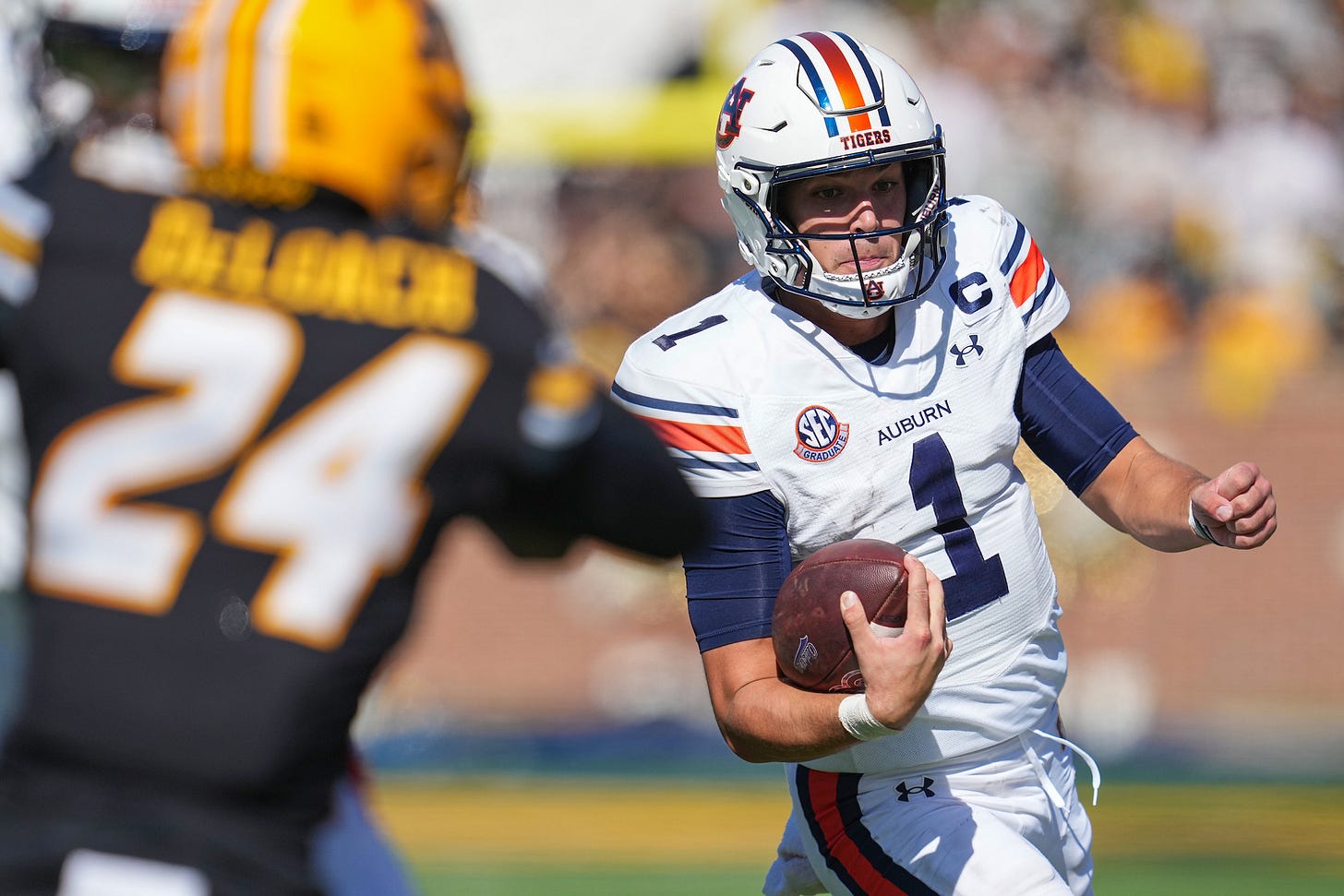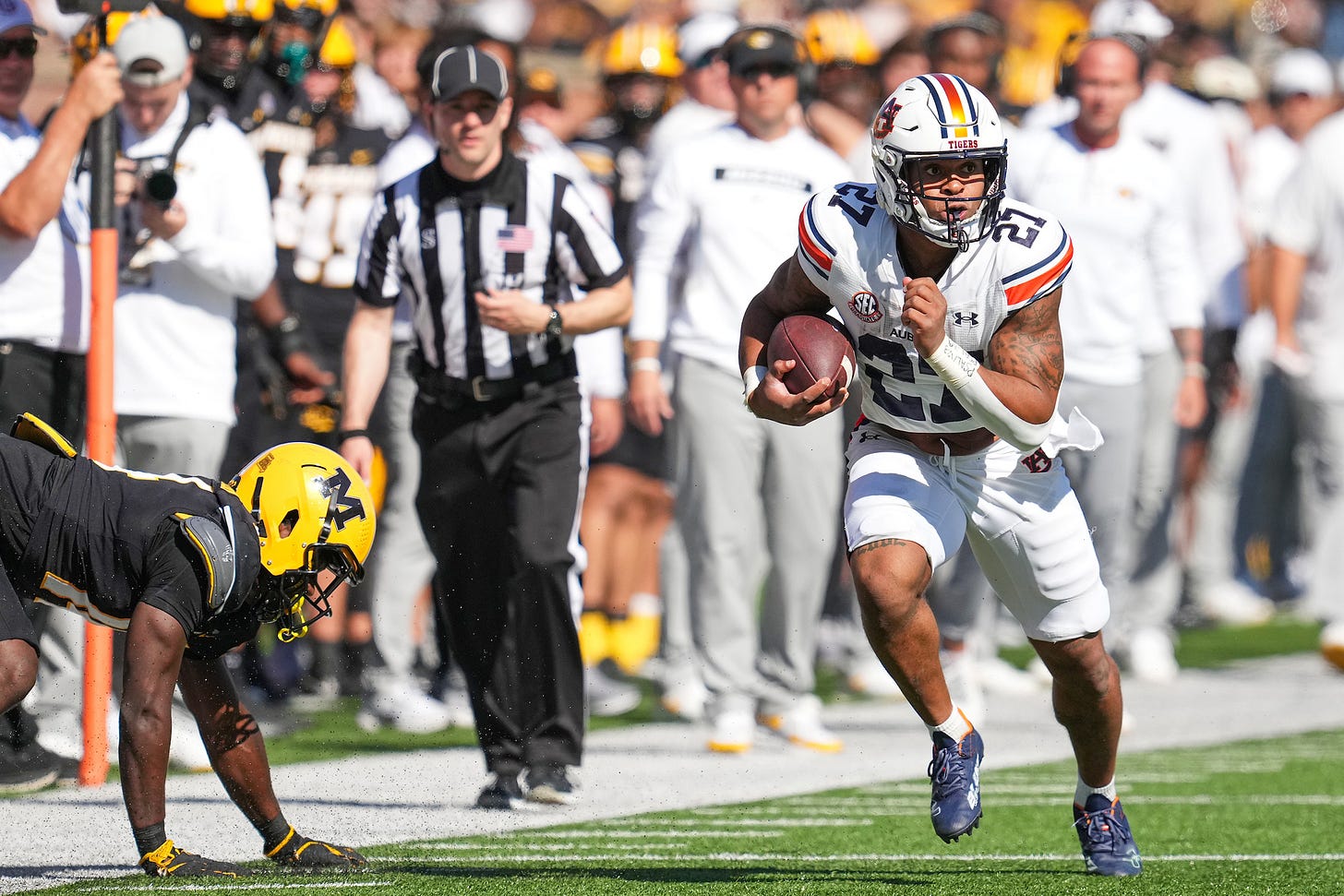Observations: Missouri 21, Auburn 17
For the second time in three games, Auburn had a double-digit lead well into the second half. And, once again, it found a way to lose.
(Zach Bland/Auburn Tigers)
COLUMBIA, Mo. — There’s a very real scenario in which Hugh Freeze and Auburn football are leaving Missouri on Saturday with non-losing records.
That scenario would have the Tigers 4-3 overall and 2-2 in the SEC so far in 2024. It also could have Freeze at 11-9 overall and 6-6 in the SEC as their head coach.
Yes, that may sound unrealistic. Auburn is actually 2-5 overall and 0-4 in the SEC in 2024, with Freeze now at 8-12 and 3-9 during his first 20 games with the program.
But, on Saturday afternoon, when Auburn had the ball at the Missouri 10-yard line with an 11-point lead and 2:03 left in the third quarter, the Tigers’ win probability was 91.9%.
Several weeks ago, Auburn’s win probability against Oklahoma peaked at 96.5% when it had first-and-10 at the opponent’s 33-yard line with an 11-point lead and 11 minutes left on the clock. And Auburn’s win probability in the 2023 Iron Bowl was at 95.1% before a fateful fourth-and-goal at the 31.
The math behind probabilities tells us that Auburn had an 84.3% chance of winning all three of those games, given those situations. It also tells us that it had a 99.9% chance of winning at least one of those games, given those situations.
Instead, Auburn finds itself in the most infuriating 0.1% — and one step closer to a fourth straight losing season for a program that hasn’t experienced that since 1950.
“We seem to not make the right call as coaches, or the right play, from time to time, in critical moments, still,” Freeze said after Auburn’s 21-17 road loss to Missouri. “And that's kind of been the story of the whole year.”
Yes, the story of Auburn’s 2024 season has been one of missed opportunities.
And it felt like Auburn had more of them than usual Saturday: Missouri gave away a touchdown on a muffed fair catch, saw both members of its starting backfield miss considerable time, missed two field goals and fumbled away a scoring chance inside the 40.
Auburn just failed to put Missouri away when it had the opportunities, plural.
Robert Lewis dropped a touchdown pass on a 1-on-1 throw from Payton Thorne during that aforementioned first-and-goal from the 10.
“The first was an RPO, and we had Robert… wish we would have had a bigger guy there,” Freeze said, referring to the 5-foot-10 Lewis. “I think it hit his hands. I haven’t seen the film, but I thought it was a really good throw. We’ve got to make those plays to win games.”
After a sack and a short pass to the outside, Towns McGough — a walk-on kicker in a massive slump — missed a 30-yard field goal.
Missouri quarterback Brady Cook, who literally went to the hospital down the street during the game, returned and converted a third-and-10 with a reception that broke away from poor tackling for a 78-yard catch-and-run. Missouri scored on its next snap and got a 2-point conversion to take a potential 18-point game to a 3-point one.
“At this point, I'm remorseful for what we're doing,” linebacker Eugene Asante said. “We've gotta play better. As a team, we have to hold ourselves to a standard. We can't let the standard drop when circumstances are good. We're able to get a muffed punt for a touchdown.
“That same intensity that we started the game with is what we need to continue to play with. I sensed it — I didn't call it out, and I have to do that, and I have to address that in those moments. We don't celebrate, we're not content, until it's 0:00.”
Auburn’s offense only got one first down the rest of the way.
Even a drive that started inside the Missouri 40-yard line ended with zero points. Then, Missouri marched 95 yards for a late, game-winning touchdown with a drive that featured three third-down conversions and a fourth-down one.
“We had so many opportunities as a defense to get off the field,” edge rusher Jalen McLeod said. “I don't care what the offense did. … They drove down 95 yards? We've got to get off the field. We've got to be better than that, simple as that. We had them second-and-18, third-and-12, however long. You've got to get off the field.”
Auburn only went backwards eight yards on the final drive to end it.
“Just not executing enough to get it done and not making enough plays when they're there,” Thorne said.
Auburn has five more games left in a regular season that continues to devolve. The Tigers needed to show on-field progression after a disappointing finish to Year 1 under Freeze. They could use some proof of concept that goes beyond improved recruiting rankings, however important those may be.
Instead, they’ve wasted chance after chance to spark a turnaround. They’ll need a near-miracle to even return to bowl eligibility. The frustration from a season that ended with an embarrassing loss to New Mexico State, an improbable loss to Alabama and a blowout bowl loss to Maryland has carried into another campaign.
And that increasingly has less to do with the notion of “talent gaps” and more to do with a failure to take advantage of the chances that are available.
Once again, that begins and ends with the head coach.
“We're not making enough plays,” Freeze said. “We’re not making enough right calls, at times, to win these close games right now.”
Here are three big Observations from Auburn’s 21-17 loss to Missouri, along with the Quote of the Day.
(Austin Perryman/Auburn Tigers)
Auburn’s offense can’t finish drives in clutch situations
An “Eckel” is a statistic coined by college football data expert Parker Fleming. It, essentially, is a “scoring opportunity” — any drive that has a first-and-10 inside the opponents’ 40-yard line or ends with a big-play touchdown from outside that range.
Heading into Saturday, Auburn’s offense ranked 82nd nationally in rate of those drives becoming Eckels, at 39.7%.
Against Missouri, Auburn had 12 total drives. Five of those drives were scoring opportunities, which is an Eckel rate of 41.7%.
So, Auburn was right where it usually was as a largely inefficient offense. Even worse, Auburn went three-and-out five times — including the first two drives of the game, right off an off week — and four-and-out in the finale. Therefore, on half of its drives, the Tigers had zero first downs.
For an Auburn offense that had shown some explosive potential at times this year, it fell back down to earth with a season-low 4.5 yards per play. The offensive line struggled to protect or run-block consistently. The Tigers failed to get over the 300-yard mark on offense for the seventh time in 20 games under Freeze.



